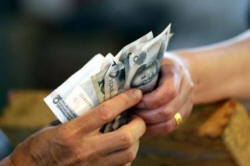|
The
People's Bank of China (PBOC) shocked global markets by
devaluing the yuan by nearly 2 percent on Aug. 11. The PBOC
called it a free-market reform but some saw it as the start of a
long-term yuan depreciation to spur exports.
The yuan's drop last week and its increased flexibility could
help "sharply reduce the possibility" of similar adjustments in
future, Ma said.
In the near term, it is more likely there will be "two way
volatility," or appreciation and depreciation of the yuan, Ma
said in a question-and-answer statement sent by email.
The central bank would move only in "exceptional circumstances"
to iron out "excessive volatility" in the exchange rate, Ma
said.
Ma played down market fears that a "currency war" could be
triggered by China's devaluation, which dragged some other Asian
currencies to multi-year lows.
"China has no intention or need to participate in a 'currency
war'," Ma said in the statement.
"There is no need to worry" that the central bank will continue
to intervene in the market to support the yuan as China's
economy stabilizes, Ma said.
"In the future, even if the central bank needed to intervene in
the market, it may be in either direction," he added.
Ma also said that he expected the economy to grow around 7
percent this year - in line with the government's target.
(Reporting by Matthew Miller; Editing by Richard Borsuk)
[© 2015 Thomson Reuters. All rights
reserved.] Copyright 2015 Reuters. All rights reserved. This material may not be published,
broadcast, rewritten or redistributed. |
|





